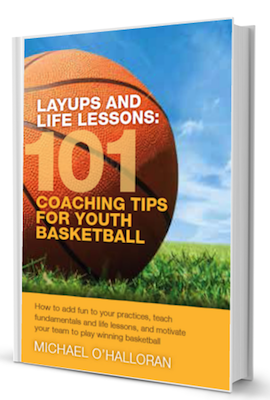EDITOR’S NOTE: The following excerpt from Michael O’Halloran’s “Layups and Life Lessons: 101 Coaching Tips for Youth Basketball.”
Cultivate an atmosphere where kids can’t wait to return to the next practice.
A challenge for youth coaches is keeping players engaged throughout the season. How do you do that? Keep it interesting. Keep it fun. Know your audience. In your practice plans, include some fun games and activities you know your players will like.
End practices on high notes so that players leave wanting more. Mix it up. Don’t stay too long with one activity. Don’t lecture too much, especially when you first take the court. Ask your assistant coaches, players’ parents and players for ideas on adding fun and keeping things interesting.
Find the right balance between working on challenging drills and easier practice topics. Spend some time on planning fun just like you might plan on teaching a basketball skill. Consider a player activity off the court for some team bonding. Teams that are enjoying the process learn more and perform better.
Teach the big lessons
Sports are great platforms to teach bigger life lessons. Some of the same issues, opportunities, and challenges that one faces in a game of soccer, basketball, or another sport are what your players might face later in their lives.
A good teaching coach can teach players the importance of working hard, setting goals, and teamwork. Lessons learned while players are young will stay with them throughout their lives.

Engage your players’ parents
Involve as many players’ parents as possible in team activities. Some possible roles on your team include scorekeepers, assistant coaches, team parents, and team party hosts. Kids seem more engaged when their parents are involved in the team. Communication with players’ parents is very important in youth sports.
Schedule an early meeting with parents to set expectations for the season, keep an updated calendar and find the best way to communicate to all parents in an efficient manner. Email lists and parent meetings after games and practices work well for many teams. Don’t be shy about handing out compliments. What parent doesn’t want to hear that their child is doing well?
Let your stars shine
Some coaches seem to try too hard to be coaching superstars at games. They’ll stand, they’ll pace, they’ll work the officials, they’ll scream, they’ll shout, and to what effect?
It distracts from their players on the court. Youth sports are ultimately about the players. Let your stars shine. Parents and fans don’t come to games to watch coaches coach. They come to watch players play. Coaches need to act their role and remember it’s a supporting role.
Create a calendar of events for your basketball season
At the start of each school year, good teachers prepare a calendar of events for the school year. On many levels, a good coach is like a good teacher. Creating a master plan for the season is a great place to start.
Basketball seasons for many teams can begin in October and go well into February. That’s a long time. Look to build events into the season at well-established times. For example, at the start of the season, you could organize a team get-together for the player to get know one another and get to know the coach better.
October brings Halloween and a natural time to invite players to dress up for a Halloween practice. December presents an opportunity for a Holiday party. You get the idea. Start your plans by building events around common calendar events.
Schedule Appropriately
Then, look at your practice schedule and game/tournament schedule. There may be some times when it would be great for your team to scrimmage another team. Before your first game or tournament, a scrimmage with a local team might just be what the doctor ordered to prep your players for game conditions.
Write it into the calendar and make a note to call some local coaches to schedule. Another good time to schedule a scrimmage is coming off the holiday break in early January.
If your team has a stretch of 3 tournaments in quick succession, you might want to schedule an event to let your players relax a bit after the second tournament so they don’t burn out on competitive fire.
Season-long Planning
It’s a good practice to look out the entire season and even plug in a couple of dates that might work for the season-ending party. You might also plug in some placeholder events where you know you want to do something special at practice to keep kids interested but don’t know what it should be. Pencil it in and solicit suggestions from other coaches and/or directly from your players.
In business, the saying goes, “Plan the work, and work the plan.” Laying out some key event dates and placeholders will give you a sense of purpose and help you visualize how the season will go.
By Mike O’Halloran
Mike has authored four books on youth basketball and coached for 15 years.
You might like the following:
Youth Basketball Coaching Special